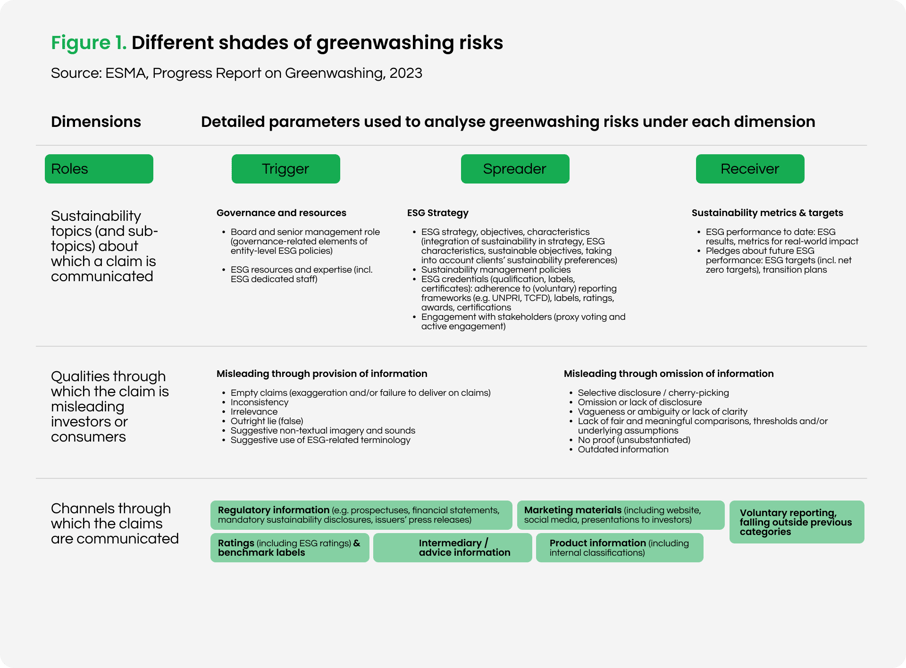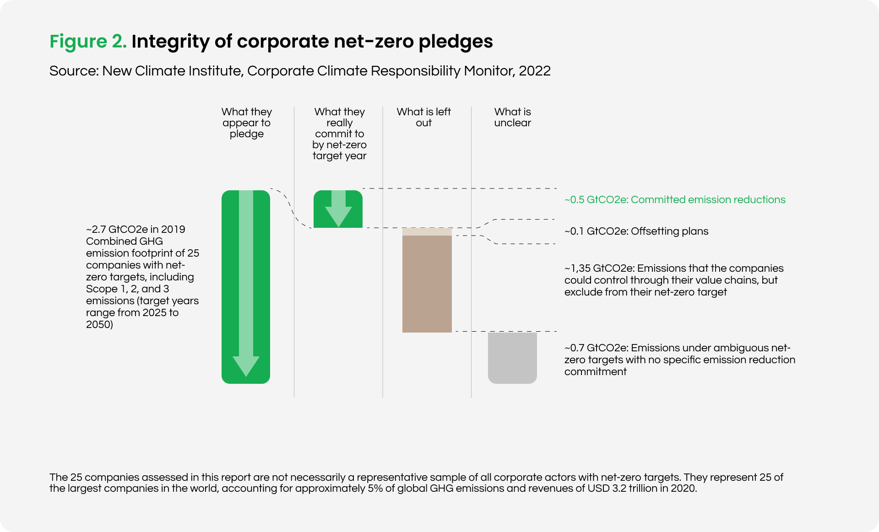Unveiling The True Cost of Greenwashing

Unveiling The True Cost of Greenwashing
By Vivian I. Asuru and Margherita Merler
Amidst the growing wave of sustainability initiatives, there is an alarming rise in greenwashing practices that cannot be ignored. Recent reports[1] have shed light on this concerning trend, revealing how some organisations are resorting to deceptive claims to bolster their environmental image.
In a world where staying abreast of ever-evolving sustainability expectations is paramount, businesses face the temptation to take shortcuts. Greenwashing appears as a convenient fix, promising quick and affordable solutions to navigate the complexities of sustainability. However, as we delve into this article, we will uncover the far-reaching consequences that greenwashing poses to businesses and discover why the allure of this shortcut may lead to costly pitfalls.
What is Greenwashing?
The European Supervisory Authorities[2] identify greenwashing as the practice where sustainability-related statements, declarations, actions, or communications do not clearly and fairly reflect the actual sustainability profile of an organisation, product, or service.

Simply put, greenwashing is the practice of falsely inducing consumers to believe that an organisation’s sustainability efforts are more solid than what they are, without substantiation.
The EU Commission in 2021[3] found that almost half of online corporate environmental claims are misleading or likely to be false. Additionally:
- 53% of green claims give vague, misleading, or unfounded information;
- 40% of claims have no supporting evidence;
- 50% of green labels offer weak or non-existent verification;
- There are 230 sustainability labels and 100 energy labels in the EU, with vastly diverse levels of transparency.
Similarly, the Corporate Climate Responsibility Monitor (2022) [4] released by the New Climate Insititute found that the climate pledges of 25 of the world’s largest corporations lack integrity and are not backed by thorough action plans.

While these findings undermine faith in corporate environmental messaging, organisations are now more than ever, being confronted with the repercussions of opting for shortcuts in their sustainability claims. Let us explore some of these consequences.
The True Cost of Greenwashing
Cases of greenwashing that present corporate risks have risen to 1 in 4, up from 1 in 5 in 2022[5]. These risks continue to be unveiled as corporate sustainability matures. Let us explore some of them.
Legal Implications
The climate change litigation database[7] shows that there have been over 2300 climate change-related lawsuits. In the last decade, cases of greenwashing have led to a loss of billions of euros in fines, with the highest being 31.1 billion euros by Volkswagen in 2020.
Reasons for some of the fines include:
- Delay in sharing emissions reports;
- False ‘greener’ marketing
- Failing to follow ESG (Environmental, Social & Governance) investment policies
- Making unsubstantiated claims on labels
Anti-Greenwashing Legislation Around the World
Across the world, several countries are unveiling anti-greenwashing legislation to protect consumers and the environment. Let's have a look at a few:
European Union (EU)
EU Parliament endorsed a provisional agreement for a new Greenwashing Directive at the beginning of 2024. The Directive sets stringent rules around green claims, the use of environmental labels and the early obsolescence of goods. The aim is to protect consumers from greenwashing and promote a circular and green EU economy. Some key highlights of the regulation include:
- General Environmental Claims Now Banned
- Sustainability Labels Soon to Be Regulated
- Rewarding Durability
Companies breaking the rules may be excluded from procurements, lose their revenues, and face a fine of at least 4% of their annual turnover.
Other relevant EU regulations include:
- The Circular Economy Action Plan
- The Right to Repair Initiative
- The Eco-Design for Sustainable Products Regulation (ESPR) Framework
- The Green Claims Directive
United Kingdom
The Consumer Protection from Unfair Trading Regulations (CPRs, 2008) aims to protect consumers from unfair or misleading trading practices, thus obliging businesses to opt for honest and fair negotiation with consumers.
The Green Claim Code, published in 2021 by the Competition and Markets Authority, provides business guidance on making environmental claims, without being legally binding.
The UK anti-greenwashing framework, set in place by the Financial Conduct Authority (FCA), defines sustainability disclosure requirements and a labelling regime. The anti-greenwashing rule will enter into force in May 2024 and apply to all regulated financial services firms.
United States
The US Federal Trade Commission’s (FTC) Green Guides help organisations communicate transparently about their products and services by clarifying:
- General principles that apply to all environmental marketing claims
- How consumers could interpret certain claims
- How to support marketing claims with thorough evidence and data
Reputational Damage
Instances of greenwashing have historically undermined brand reputation and eroded customer trust. With the proliferation of greenwashing, modern consumers are increasingly sceptical of businesses’ sustainability claims. For instance, findings[8] suggest that 88% of American Gen Zs do not trust brands’ ESG claims.
While greenwashing may seem like an inconsequential decision for organizations, it often carries profound consequences for consumers.
False claims regarding a product's natural qualities, for example, can jeopardize the health and safety of consumers. Developing a reputation for endangering consumers' well-being can significantly damage overall brand experience and acceptance.
Additionally, products marketed as green or sustainable typically command higher prices, leading consumers to feel deceived. In an era of heightened information sharing, being known for misleading consumers can severely harm brand goodwill, resulting in a loss of competitive advantage.
Furthermore, recognising that consumers are individuals with diverse backgrounds and interests underscores the importance of ethical business practices. Consumer dissatisfaction with deceptive practices often prompts regulatory action to protect their interests.
A prime example is the UK’s Advertising Authority (ASA) banning certain Shell renewable energy commercials because they had found them to have given a misleading impression of the size of the group’s lower carbon business.
Financial Consequences
From the financial ramifications of fines to the erosion of customer trust, it is evident that greenwashing poses a costly risk. Another critical aspect worth considering is its impact on investor confidence.
This year has seen a significant influx of funds committed to sustainability, with billions of euros allocated to green initiatives globally.
However, financial services are responsible for a 70% surge in greenwashing incidents[9]. The result of this finding places them under heightened scrutiny regarding the authenticity of their proclaimed sustainable investments.
For instance, the UK Financial Conduct Authority (FCA) is set to implement a green labelling system in July 2024 to combat greenwashing by fund managers. Additionally, global banking regulators such as the Basel Committee on Banking Supervision (BCBS) now mandate lenders to disclose their climate impacts.
These regulatory measures will snowball through the relationship between organizations and their investors, prompting financial institutions to adopt stricter measures to mitigate the repercussions of greenwashing.
Best Practices to Avoid Greenwashing
There is internal awareness about the rise in greenwashing. In a 2023 poll conducted on over 1,491 CEOs around the world managing businesses with 500+ FTE (Full Time Equivalent), 67% of CEOs acknowledged that their organisations are guilty of greenwashing.
However, the study also shows a willingness to make better sustainability decisions. The challenge is in the know-how.
Here are some initial guidelines to avoid greenwashing:
- Avoid setting unrealistic sustainability goals
- Ensure your claims are feasible and concrete
- Collect data and interpret them correctly
- Support your claims with tangible evidence
- Adopt standardised labels
- Grow awareness within your organisation
- Get external assurance
- Get support from reliable sustainability partners
You can find a more detailed approach to avoiding greenwashing in our earlier article here.
Our Approach to Avoiding Greenwashing
At Nexio Projects, we are very conscious of the risks and implications of greenwashing for ourselves and our clients, and this is why we take serious measures to avoid it. We have an anti-greenwashing policy that helps us not just advise our clients, but ensure we are not engaged in greenwashing by association. This protocol was drawn up by our in-house Ethics Committee led by Nexio Projects Chief Strategy Officer, Felix Keser. He shares:
Greenwashing in corporate sustainability isn't just an ethical issue: it is also a clear business risk. To combat risks of greenwashing, Nexio Projects implemented an extensive anti-greenwashing protocol that ensures our clients engage in the genuine pursuit of sustainability, rather than a 'smoke and mirrors' exercise. The protocol identifies key risks our consultants might face on their projects and provides clear guidelines on how to prevent these. Furthermore, it outlines actions to address them if they occur. By doing so, we guide our clients to embrace the true value of sustainability disclosures and certifications for real impact.
Conclusion
In conclusion, it is imperative for all stakeholders involved in making sustainability claims to recognize that, from a marketing and storytelling standpoint, an authentic narrative depicting the complexities of a journey is inherently more compelling than a fabricated tale of success.
While greenwashing may offer short-term gains, its long-term repercussions can severely damage a business's reputation and ethics. Embracing sustainability as a continuous journey, taking small steps forward, and openly addressing challenges and improvement plans fosters trust and appreciation from stakeholders.
By prioritising transparency and genuine progress, businesses can build credibility and resilience in the face of evolving sustainability expectations.
Sources
[1] https://www.reuters.com/sustainability/banks-behind-70-jump-greenwashing-incidents-2023-report-2023-10-03/
[2] https://www.esma.europa.eu/press-news/esma-news/esas-put-forward-common-understanding-greenwashing-and-warn-risks
[3] https://ec.europa.eu/commission/presscorner/detail/en/ip_21_269
[4] https://newclimate.org/resources/publications/corporate-climate-responsibility-monitor-2022
[5] https://www.edie.net/on-the-rise-one-in-four-cases-of-esg-risks-linked-to-greenwashing/
[6] https://www.esma.europa.eu/sites/default/files/2023-06/ESMA30-1668416927-2498_Progress_Report_ESMA_response_to_COM_RfI_on_greenwashing_risks.pdf
[7] https://climatecasechart.com/
[8] https://www.mckinsey.com/~/media/mckinsey/email/genz/2022/12/06/2022-12-06b.html
[9] https://www.reuters.com/sustainability/banks-behind-70-jump-greenwashing-incidents-2023-report-2023-10-03/
